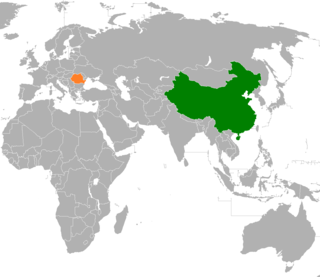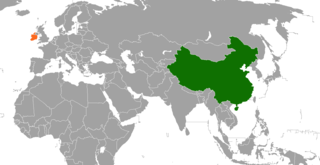Related Research Articles

A diplomatic mission or foreign mission is a group of people from a state or organization present in another state to represent the sending state or organization officially in the receiving or host state. In practice, the phrase usually denotes an embassy or high commission, which is the main office of a country's diplomatic representatives to another country; it is usually, but not necessarily, based in the receiving state's capital city. Consulates, on the other hand, are smaller diplomatic missions that are normally located in major cities of the receiving state. As well as being a diplomatic mission to the country in which it is situated, an embassy may also be a nonresident permanent mission to one or more other countries.
Being part of the Kingdom of Denmark, the foreign relations of Greenland are handled in cooperation with the Danish government and the Government of Greenland.

The Taipei Economic and Cultural Representative Office (TECRO), also known as Taipei Economic and Cultural Office (TECO), Taipei Representative Office (TRO) or Taipei Mission, is an alternative diplomatic institution serving as a de facto embassy or a consulate of the Republic of China to exercise the foreign affairs and consular services in specific countries which have established formal diplomatic relations with the People's Republic of China. As the PRC denies the legitimacy of the ROC as a sovereign state and claims the ROC-controlled territories as an integral part of its China. An exclusive mandate namely One-China policy, mandates any country that wishes to establish a diplomatic relationship with the PRC must first sever any formal relationship with the ROC. According to The Fletcher Forum of World Affairs, "non-recognition of the Taiwanese government is a prerequisite for conducting formal diplomatic relations with the PRC—in effect forcing other governments to choose between Beijing and Taipei." As a result, these countries only allow the ROC to establish representative offices instead of a fully-fledged embassy or consulate for the purpose of conducting practical bilateral relations without granting full diplomatic recognition.

A consul is an official representative of a government who resides in a foreign country to assist and protect citizens of the consul's country, and to promote and facilitate commercial and diplomatic relations between the two countries.

In a referendum on 21 May 2006, the people of Montenegro opted to leave the State Union of Serbia and Montenegro. This result was confirmed with a declaration of independence by the Montenegrin parliament on 3 June 2006. It simultaneously requested international recognition and outlined foreign policy goals.

The Ministry of Foreign Affairs is the governmental body responsible for conducting foreign relations of the Republic of Turkey. The Ministry is responsible for Turkey's diplomatic missions abroad and for the promotion of Turkish culture, as well as for implementing the country's foreign policy in accordance with its national interests. Established on 2 May 1920, its primary duties are administering diplomatic missions, negotiating international treaties and agreements, and representing the Republic of Turkey at the United Nations. The ministry is headquartered in the Turkish capital of Ankara and counts on more than 200 missions as embassies, permanent representation offices and consulates general, abroad. As of 2021, the Ministry of Foreign Affairs maintains 235 diplomatic posts worldwide. The current Minister of Foreign Affairs is Hakan Fidan, who has held the position since 3 June 2023.

The Ministry of Foreign Affairs is a cabinet-level ministry in the government of the Republic of China (Taiwan). It is headquartered in Zhongzheng District, Taipei. The incumbent minister is Joseph Wu, who took office in 2018 and is affiliated with the Democratic Progressive Party.

The Kingdom of Romania and Republic of China (ROC) began relations on July 5, 1939.

China–Ireland relations are interstate relations of China and Ireland. Ireland and China first established their bilateral foreign relations after they signed the Communique on the Establishment of Diplomatic Relations on 22 June 1979. This milestone opened the gate for trades, businesses, politics, education, and tourism between the two countries; both nations have gained enormous growth of economic values. Both countries exchanged ambassadors in 1980. Ireland has an embassy in Beijing, a general consulate in Shanghai and an honorary consulate in Hong Kong; China has an embassy in Dublin. The first historical meeting for the two headers of China and Ireland governments took place in November 1996 when Premier Li Peng met with Taoiseach John Bruton at the World Food Summit. By 2019, this bilateral relationship has boomed to a high point, and a ceremony of their 40th anniversary of diplomatic relations was held in Dublin, Ireland in June 2019.

Bolivia–China relations are foreign relations between the Plurinational State of Bolivia and People's Republic of China. Relations between both nations officially began on July 9, 1985. Both nations are members of the United Nations.

The Embassy of the United States in Beijing is the diplomatic mission of the United States in China. It serves as the administrative office of the United States Ambassador to China. The embassy complex is in Chaoyang District, Beijing.

The Consulate General of the United States in Wuhan is one of the seven American diplomatic and consular posts in the People's Republic of China.

The Embassy of Mexico in China, based out of Beijing, is the primary diplomatic mission from the United Mexican States to the People's Republic of China.

The Embassy of the Republic of Indonesia in Beijing is the diplomatic mission of the Republic of Indonesia to the People's Republic of China. The embassy is concurrently accredited to Mongolia. Indonesia also has three consulate generals in Guangzhou, Hong Kong, dan Shanghai. The first Indonesian ambassador to China was Arnold Mononutu (1953–1955). The current ambassador, Djauhari Oratmangun, was appointed by President Joko Widodo on 20 February 2018.
References
- ↑ Bramsen, Christopher Bo (2008). Peace and Friendship 1674-2008. China Science Culture Publishing House. p. 125. ISBN 978-988-17372-9-8.
- ↑ "The Trade Council".